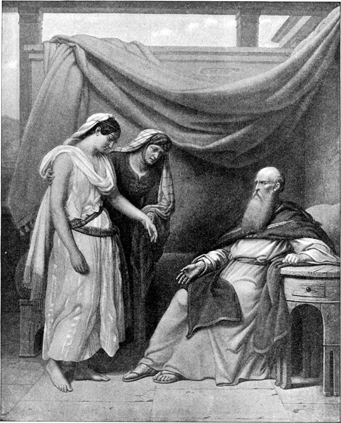The views expressed in our content reflect individual perspectives and do not represent the authoritative views of the Baha'i Faith.
There is nothing greater or more blessed than the Love of God! It gives healing to the sick, balm to the wounded, joy and consolation to the whole world, and through it alone can man attain Life Everlasting. The essence of all religions is the Love of God, and it is the foundation of all the sacred teachings.
It was the Love of God that led Abraham, Isaac, and Jacob, that strengthened Joseph in Egypt and gave to Moses courage and patience. – Abdu’l-Baha, Paris Talks, p. 82.
As had been promised more than a year earlier, before the destruction of Sodom, Abraham’s wife Sarah became pregnant.
In due time, Sarah delivered a bouncing baby boy. Abraham named the boy Isaac, as God previously directed Him to do. Sarah, thrilled at having a baby after so many barren years, exclaimed, “God has brought laughter for me; everyone who hears will laugh with me.” This image of delight beautifully expresses the joy of the moment, while simultaneously reminding us that Isaac means “he will laugh.” Abraham was equally pleased at having another son and a second heir. According to Muhammad, he rejoiced with these words: “Praise to God who hath bestowed on me, notwithstanding my old age, Ishmael and Isaac!”

Abraham, Sarah and Hagar
Sarah’s uncomplicated joy at having a son of her own lasted for a year or even two—until the day Isaac was weaned and Abraham hosted a feast in his honor. During the party, “Sarah saw the son of Hagar the Egyptian, whom she had borne to Abraham, mocking [Isaac].” Furious, Sarah said to Abraham, “Drive out this maid and her son; for the son of this maid shall not be an heir with my son Isaac.”
The mocking done by Ishmael is thought to indicate a boast that he, as the firstborn son, stood to inherit more from Abraham than his younger half-brother, a sort of a Daddy-loves-me-best taunt. The boast would have been based on the common traditions of inheritance, which gave preference to a firstborn son and allotted him twice as much as a second-born. Sarah, hearing the taunt, would have wanted to protect Isaac and find a way to make sure that he received at least as much as Ishmael. To do this, she would have to invoke her own right, as Abraham’s true wife, to claim precedence for her own firstborn son over the firstborn son of the concubine, even though the concubine’s son was the elder son. If Abraham sent Hagar and Ishmael away, it would be a clear indication to Hagar and to everyone else that Abraham himself recognized Sarah’s right to claim for Isaac the station of being the primary heir.
Genesis states that Abraham, who loved Ishmael dearly, was distressed by Sarah’s request to cast Hagar and Ishmael out. To allay this distress, God said these words to Abraham:
Let it not be grievous in thy sight because of the lad, and because of thy bondwoman; in all that Sarah hath said unto thee, hearken unto her voice; for in Isaac shall thy seed be called. And also of the son of the bondwoman will I make a nation, because he is thy seed. – Genesis 21:12–13.
Hearing these words of comfort, Abraham is assured that Hagar is still slated to receive what she was previously promised: a great nation through Ishmael “because he is thy seed.” It also becomes clear at this point that what is happening is a fulfillment of a previous prophecy. When Hagar was first pregnant with Ishmael, the angel of the Lord informed her that Ishmael would live “to the east.” So when Sarah asks Abraham to cast Hagar and Ishmael out, she is not really twisting the plot at all. Sarah fulfills what was destined from the beginning: Isaac’s line will continue in Canaan, while Ishmael must travel east to claim his rightful place.
The phrase “in Isaac shall thy seed be called” catches the eye because it does not limit Isaac’s descendants to one great nation, one great religion, or one great event. Zera, the Hebrew word that is translated as “seed,” also implies posterity and sowing-time, thus imbuing the phrase “in Isaac shall thy seed be called” with the sense of an immense span of time. Indeed, this phrase allows for the possibility of numerous occasions when God might call out to Isaac’s posterity and raise a new nation, or sow the seed of a new religion by anointing a new messenger of God.
Abraham is, as always, obedient to the command of God:
Early the next morning Abraham took some food and a skin of water and gave them to Hagar. He set them on her shoulders and then sent her off with the boy. – Ibid., 21:14.
Next: Abraham, Hagar and Ishmael in the Wilderness
















Comments
Sign in or create an account
Continue with Googleor